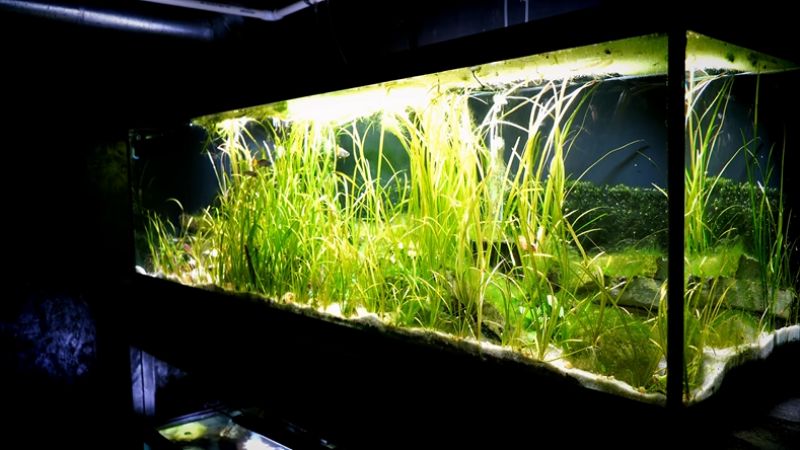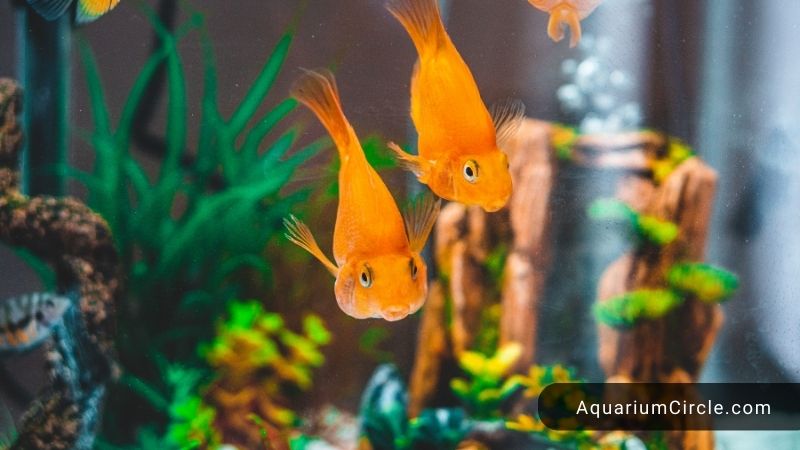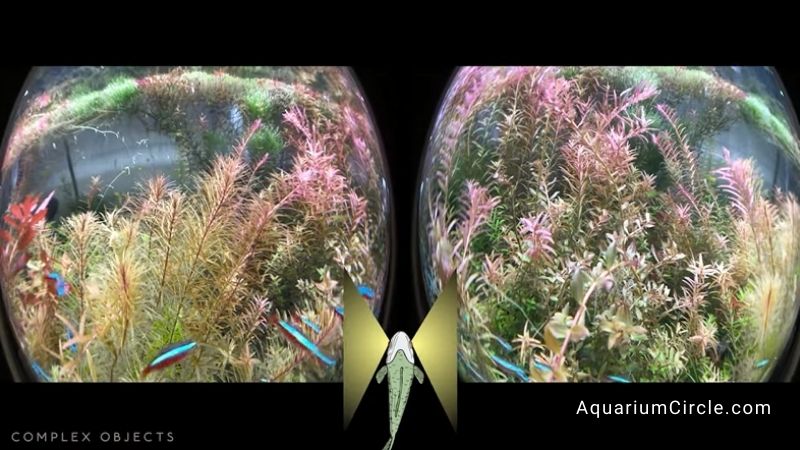Have you ever wondered how fish navigate and hunt in the dark depths of the ocean? Can they see in the dark? While most fish have evolved into seeing in dimly lit environments, it’s a common misconception that they can see in complete darkness. In this article, we’ll explore the fascinating topic of whether fish can see in the dark and how they adapt to low-light conditions.
Can Fish See In The Dark?
Fish can’t see in periods of darkness, but certain species have developed particular adaptations that enable them to see in dimly lit environments. The eyes of many fish include a lot of rod cells, which are more sensitive to light than the cone cells that are responsible for color vision. Certain fish also have a tapetum lucidum, which is a reflective layer located behind the retina that improves low-light vision by reflecting incoming light through the retina. However, the ability of fish to see in the dark varies between species and is influenced by things like the cleanliness of the water and the quantity of light present.
What Colors Can Fish See?
Fish can detect colors, as evidenced by the presence of rods, cones, and pigment granules. But, we would need to consider what wavelengths of light can enter a fish’s eye if we were to investigate which colors fish can see.
The amount of light that a fish’s vision can be exposed to depends on the type of water. Moreover, sunlight must navigate a number of barriers in nature before it can enter a fish’s eye. A clean body of water will more easily absorb violet and red wavelengths under ideal water conditions, but blue wavelengths will penetrate farther.
That explains why photos taken by scientists of the deep water appear to be saturated with blue. Researchers have focused their research on deep-sea fish, the only group of fish that spends the entirety of their lives out of the sun. Deep-sea fish’s eyesight has an amazing adaption that enables them to see the light in the full spectrum of bioluminescence, from different hues of blue and green to yellow. After a team of experts examined the Silver Spinyfin, we discovered proof that deep-sea fish could discern colors in the dark (Diretmus Argenteus).
What colors of light is the best for fish?

Depending on the type of cones in their eyes, fish have distinct perceptions of various colors. Red light is less ideal since it can interfere with fish and plants’ natural behavior and sleep cycles. In general, blue and green light is better for fish and plant growth. A dim light or even complete darkness can be advantageous for fish because many of them are acclimated to low-light situations, which will help them behave naturally and reduce stress. If aquarium plants are present, it’s crucial to give enough light for their growth and well-being.
All freshwater tanks benefit from RGB SPECTRUM lighting. A full and colorful RGB (Red, Green, Blue) variety of lights is the best way to bring out vibrant colors and brighten your tank. It goes beyond simply giving your fish a vibrant hue. It does not, however, promote the growth of algae.
Should we keep the light on in the aquarium?
I don’t think fish need to have a light on always. It is advised to have a consistent schedule of light and dark phases to simulate the natural day and night cycle. By doing so, stress is reduced, and the fish’s circadian cycle is regulated. Generally speaking, it’s advised to leave the aquarium light off for the other eight to ten hours of the day. It’s crucial to select the proper light intensity and spectrum for the aquarium’s plants and animals.
Fish are more likely to feel the natural cycle of day and night as it unfolds over the day. Even nocturnal fish are used to the two primary daylight hours. You must make sure the lights are on for roughly 12 hours, even if you keep your pet fish in a completely dark room.
To keep a healthy cycle, you must turn them off thereafter and do this consistently every day. Seeing the day cycle outside and simulating it inside the aquarium is even more natural. After all, the length of the day varies, and the species of fish you maintain at home may be sensitive to it.
How Do Fish See With Lateral Line System?
The lateral line system is used by fish to assess their surroundings and travel through the water. The fish’s body is covered in a network of tiny sensory organs called neuromasts, including those in the head and tail. Fish use these neuromasts to sense nearby prey, predators, and obstacles by detecting changes in water pressure, vibration, and movement. Fish can locate areas of suitable habitat by using the lateral line system to sense changes in water currents and temperature. Generally, fish can successfully navigate their underwater surroundings because to the lateral line system, an essential sensory system.

All fish species have a slightly more complicated vision, largely because they reside underwater. Water, whether freshwater or salty, comes in a variety of colors, from clear to tea-colored to even “cloudier.”
Water conditions can quickly alter in open water because it is such a volatile environment. As fish are examining their environments, even a brief shower might cause a significant alteration in their vision. Water coated in an ice layer is the cleanest water with the fewest variables for fish in the wild.
You may imagine a certain amount of fog perpetually obstructing a fish’s vision. A variable-density fog that can occasionally be thinner (when fewer particles are moved) and occasionally thicker (think of shallow lakes with plenty of dissolved organic matter). These incredibly handy protruding lenses are exactly what give fish eyes their bug-eyed appearance. Fish see far better underwater than any human diver due to a broader range of vision. Fish often swim with their lenses pushed forward because it gives them the clearest view of nearby (or approaching) objects.
Can Fish See The Food In The Dark?
In complete darkness, aquarium fish aren’t precisely vision-impaired. Nonetheless, they may still use their lateral line system to look for food or hunt for prey even at night. The neuromasts (lateral line organs) of a fish will help it navigate the aquarium in the dark and warn it if it is approaching other fish or moving or floating food too closely.
If the animals in your tank eat at night, you can safely feed them right after turning off the lights in the aquarium. In addition to letting them eat in the setting they choose, this will stop food from going to waste. Plecos and other nocturnal fish can be fed in the dark.
The Peters’ Elephantnose fish is one kind of tropical aquarium fish that has a weak electrical organ on its caudal fin. It functions in a similar fashion to how electric eels in the wild move through the water.
Certain fish species have evolved to detect prey using their upward-facing eyes. They can identify prey by contrasting their profile with the low light from above. The Bigeye tuna, the Barreleye fish, and the Lantern fish are a few examples of animals that have adapted to this method of “seeing in the dark.”
Can your fish recognize you?
Certain fish have olfactory, auditory, and visual recognition abilities. Even though it might take some time for the fish to get used to its owner, some fish species have demonstrated the capacity to recognize various people and react to their presence. A fish’s ability to recognize its owner may vary depending on its level of intelligence and perception, though, as not all fish possess these qualities to the same extent.
Can fish recognize their tank mates?

Are fish able to recognize their tank mates if they can see and recognize humans? There is a ton of evidence tremendous back up the idea that fish can recognize one another. Still, intriguingly, fish have also demonstrated to scientists that they can develop attachments to other tank mates.
We now know the answer, which is “Yes!”, thanks to a study that was specifically designed to investigate if fish can create a connection with other fish in a tank. The tank mates developed a friendship and liking for one another after about 10 or 12 days. However, the attachment seen even caused fish to become aggressive toward new fish that were added to the same aquarium. Few fish species have been examined in studies of this kind.
What Do Fish Do At Night?
Orienting oneself in the dark is not at all problematic for fish species. They are rather adept at it because they don’t rely as heavily on their vision. They can sense pressure changes in the water with their sensitive organs, which is a far more dependable way for them to find food and refuge and swim around in general.
The lateral lines of your fish are visible there. They employ those to detect adjacent fish precisely. Nonetheless, nocturnal fish species will probably spend most of their time sleeping in the dark.
They have an internal clock that informs them when to go to sleep, just like humans do. Also, just like it does for us, they find it simpler to fall asleep in the dark.
Do fish sleep at night?
Fish do not slumber in the same manner as people. They do, however, occasionally have rest periods during which they are less active and may choose to be somewhere quiet. Even while some fish may sleep in a certain part of the tank or become less active at night, they are nonetheless vigilant and conscious of their environment. To control fish’s natural activities and make sure they are receiving enough sleep, it is crucial to maintain a regular cycle of light and darkness.
Which fish be active at night?
Several fish species prefer to be active at night because they are, by nature, more active than. These fish are classified as nocturnal. Catfish, several varieties of cichlids, eels, and loaches are a few examples of nocturnal fish. Compared to during the day, these fish may be more active and exhibit more natural behaviors at night.
Are Fish Afraid Of Dark?
Given that fish see the light and dark differently than humans do, they may not necessarily have an innate dread of the dark. If abrupt changes in lighting do not shock or stress fish, they may prefer a more regular illumination schedule. Also, it’s possible that some fish species are, by nature, more active at night than during the day. Certain fish, however, might be frightened of specific dark places or things they connect with danger or predators. For instance, certain fish may be cautious around underwater caverns or gaps where predators might be hiding.
Fish may also become alarmed and take evasive action in response to unexpected changes in brightness, like the sudden advent of darkness. Since fish’s visual system is tailored to their natural habitat, which may include periods of low light or darkness, fear of the dark is not a universal response in fish. Nonetheless, some fish might have developed a fear of the dark or might be naturally wary of specific dark locations in their ecosystem.
FAQs
Can Molly fish see in the dark?
Although molly fish have excellent vision and can see in dim light, they cannot see in total darkness. They can adjust to various light levels and have evolved into seeing in poorly lit areas. To see and travel effectively, they still need some light in their surroundings. It is advised to maintain a consistent light-dark cycle in their tank to encourage their healthy natural behaviors.
Can guppy fish see in the dark?
Guppy fish have night vision, but they are blind in total darkness. They contain unique cells in their eyes, known as rods and cones, that enable them to see in various lighting settings, just like the majority of fish. To observe their surroundings, they do need a certain amount of ambient light.
Can betta fish see in the dark?
While betta fish can see in dim light, they are not nocturnal, which means they are not accustomed to total darkness. They depend on light to travel and find food, yet they have well-developed eyes that let them perceive colors and objects even in poorly lit situations. Bettas would have a difficult difficulty seeing anything at all in total darkness. Hence, even at night, it is advised to offer some sort of lighting in their tank.
References:
- Wikipedia – https://en.wikipedia.org/wiki/Fisheye
- Vision in fish – https://en.wikipedia.org/wiki/Vision_in_fish#:~:text=Fish%20eyes%20are%20similar%20to,or%20further%20from%20the%20retina.

Annette M. Chaney is an experienced marine biologist with over 20 years of experience as an aquarist and fishkeeper. She started her first aquarium at a young age, filling it with frogs and goldfish obtained from the ten-cent pet store.
Annette grew up caring for and breeding African Cichlids, which led to a hobby in high school that doubled as a profitable means. Attending Reed College gave her time to solidify herself as an accomplished aquarium caretaker with an eye for sales. After that, from 2009 – 2013, she studied at Roger Williams University – one of the most prestigious universities for Aquaculture and Aquarium in USA. She is the founder of AquariumCircle since 2010.
